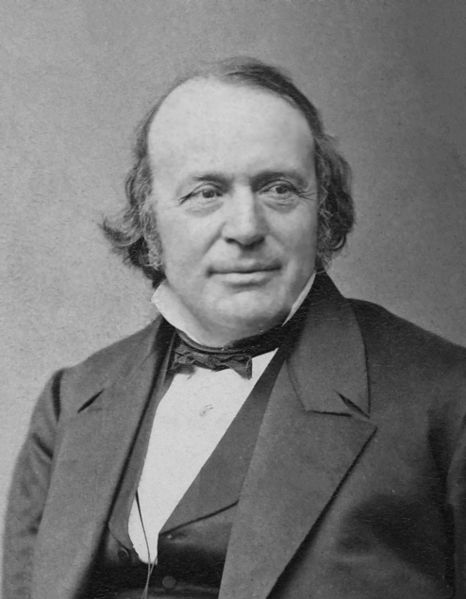 Humanities magazine gives some sense of the academic contentions in studies of evolution in 19th century America, as they affected the life and work of famous Swiss American naturalist Louis Agassiz (1807–1873):
Humanities magazine gives some sense of the academic contentions in studies of evolution in 19th century America, as they affected the life and work of famous Swiss American naturalist Louis Agassiz (1807–1873):
Yet, there are other images of Agassiz, too, and they inevitably crowd out that lovely picture of the late-night watcher of jellyfish and the charming, if exasperating, collector of Amazonian fish. For this is what he was, too: an irascible, impatient, unpredictable professor who insisted that whatever his students did in his laboratory belonged to him; a savvy navigator of contemporary academic politics, who had Harvard presidents and Massachusetts businessmen eating out of his hand; a self-declared expert on the human races who required that slaves (first in the American South and then in Brazil) pose for demeaning photographs so that he could entertain himself and others by pointing out the alleged physical deficiencies that separated them from the white master race. Agassiz’ racist theorizing did a lot of damage, and there is little comfort to be derived from the fact that his views were embraced even by some of the abolitionists among his friends. Agassiz believed that the world was like a child’s puzzle box, a game that could be sorted out by anyone willing to look and learn. And yet Agassiz himself was a still bigger puzzle, one that even today never yields a coherent, definitive image.
Charles Darwin, his main antagonist, openly ridiculed Agassiz, even while he would continue to turn to him for advice on natural history matters. Darwin knew that he had to demolish Agassiz, whose worldwide fame and well-known contempt for any interpretation of nature that smacked of “development” (a word Agassiz, significantly, never learned to pronounce properly) seemed major obstacles to the wider acceptance of evolution in America. Fortunately, Darwin could rely on the services of the infinitely capable Asa Gray (1810–1888), a professor of botany and Agassiz’ colleague at Harvard. Agassiz was not prepared for resistance from within his own kingdom. The nimble-minded Gray had recognized Darwin’s importance early on and even contributed his own share to evolutionary thinking. After surveying the plant specimens sent to him from the U.S. North Pacific Exploring Expedition, Gray noted the surprising similarities between trees found in eastern Japan and the eastern United States, a fact that he knew could not be explained by Agassiz’ view that everything had been created separately according to some divine master plan.
Asa Gray, rail thin, short, always in a hurry, was the opposite of Agassiz in almost every respect, not only physically, but temperamentally. Today we would like to think of the struggle between the supporters and opponents of evolution as a duel between progressives and reactionaries, but this is not how things played out in the nineteenth century. Agassiz, a minister’s son who rejected organized religion and instead believed in the divinity that resides in all people (as long as they were white), was never to be found inside a church, while Gray was a devout Presbyterian who had once taught Sunday school and did not work on the Lord’s Day. Professor Gray had no problem regarding evolution as the ultimate proof of God’s power, a fact that bothered his friend Darwin, who once acidly remarked that while the perennially optimistic Gray was keen on observing the raindrops that nourish the earth, he, Darwin, was more interested in those that fall in the ocean—a wonderful way of summarizing Darwin’s view of nature in which there is little to offer comfort to muddleheaded humanity.
But when it came to pointing out Agassiz’ scientific fallacies, Gray pulled no punches. …
What did Gray do? Ah, that’d be telling, wouldn’t it? 😉